






Autumn A. Graves, Ed.D., Head of School
A. Randol “Randie” Benedict, M.S.Ed., Associate Head of School
Lisa Nguyen Ha, M.P.A., Chief Strategic Communications Officer (CCO)
Lisa Keeler, M.Ed., Head of the Lower School
Seth Kushkin, Director of Athletics (AD)
Marie Reed, M.A., Head of the Middle School
Beth Miller, M.Ed., Head of the Upper School
Tim Stutzman, M.B.A., Chief Operating & Financial Officer (COFO)
Pamela “Pam” Winthrop, M.A., Chief Advancement Officer (CAO)
Mission
“We wish our students to become strong in body, broad of mind, tender of heart, responsive in soul.”
— Mary Hyde DuVal, Founding Headmistress
To inspire and prepare the next generation of exemplary citizens and visionary leaders.
Integrity: Cultivating responsible, honorable, ethical behavior
Curiosity: Fulfilling our desire to question, to know and to learn for a lifetime
Diversity: Seeking to know, learn from and value one another
Creativity: Expecting imaginative, critical and divergent thinking
Agency: Empowering students to own their learning Impact: Accomplishing meaningful, significant work for the greater good
St. Anne’s-Belfield School is a best-in-class, co-educational independent school in Charlottesville, Va. serving students age 2 through Grade 12. The School’s present structure is the result of the merger of St. Anne’s School, a girls’ boarding school founded in 1910 by the Reverend Dr. Henry Bedinger Lee, Rector of Christ Church (Episcopal) of Charlottesville, and Belfield School, a co-educational elementary school established in 1955. Situated on two campuses totaling more than 50 acres, St. Anne’s-Belfield School graduated its first class in 1974. While an interfaith Chapel remains one of the
Anne’s-Belfield School
School’s most treasured traditions, the School is no longer affiliated with the Episcopal church or any particular religion.
We at St. Anne’s-Belfield School believe that our students will become exemplary citizens and visionary leaders because of the inspiration of exceptional teachers and the nourishment of every child’s innate curiosity. Our mission is to feed this curiosity through exceptional, innovative teaching and learning in an intentional age 2 through Grade 12 community in which close relationships provide the foundation for achievement and where every child is known well. Curiosity — that desire to grow, know, ask, create, and solve — is both the fuel of learning and an essential ingredient to success in an ever-changing world; it must be encouraged from the earliest years and throughout life. Our goal is to nourish our students’ curiosity about themselves, their world, and the diverse people around them, in an educational experience that inspires, challenges, and stimulates innovative, empathetic, and creative thought. We pose compelling questions and seek answers through inquiry, application of core skills, development of essential habits, thoughtful reflection, collaboration with others, and the appropriate use of technology. The questions we ask and the answers we seek reflect our commitment to the cultivation of responsible, honorable behavior and to a mindfulness of the needs of others.
We strive to equip our students with the knowledge, skills, habits, and attitudes that will allow them to pursue their dreams in a rapidly changing and increasingly technological world, and to be exemplary citizens in life and work. Ours is a challenging yet charitable community distinguished by superior instruction that is cutting edge and student driven; by exceptionally knowledgeable and highly-trained teachers; and by an environment that exalts growth over grades by providing a culture of intellectual candor and rich feedback. Our community strives for excellence in all aspects of School life and encourages students to discover and develop empathy, diversity of perspective, adaptability, flexibility, resilience, agency, self-efficacy, and inventiveness. We embrace uncompromisingly high expectations for ethical, selfless behavior and hold firmly to our commitment to inclusion, civility, and kindness.
The Portrait of a 2036 Graduate is an articulation of the habits, mindsets, and skill sets that St. Anne’s-Belfield School believes are essential for our graduates in the present and the future. With the first phase completed in 2023-24, it is an aspirational document and applicable in an age-appropriate manner for our entire student population, from age 2 to Grade 12. The date, 2036, symbolically represents the year
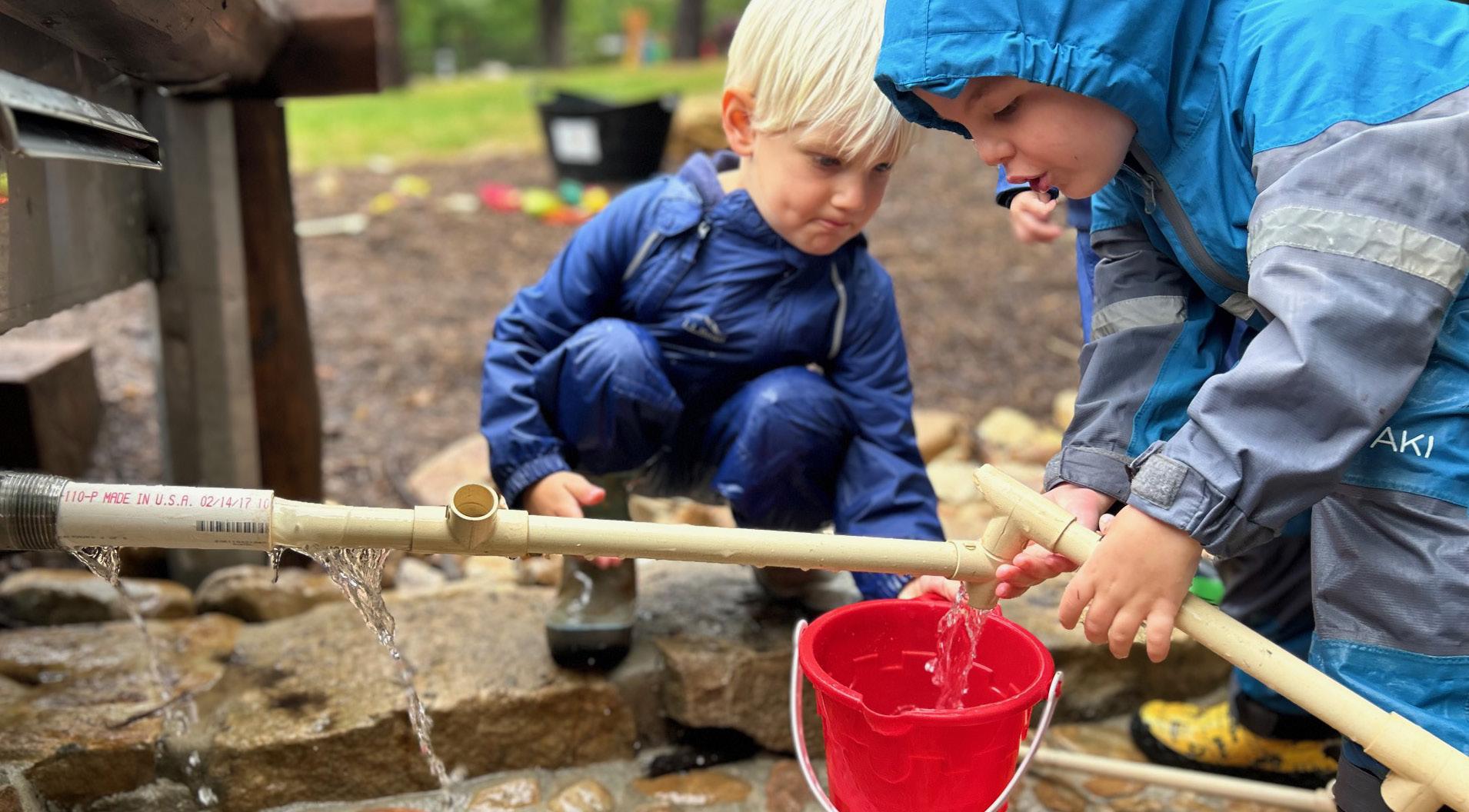
that the then-Kindergarten students will walk the stage at Commencement. The Portrait ties together the St. Anne’sBelfield School mission, vision, and core values. We believe that all of our students should become exemplary citizens, as stated in our school vision statement. We define exemplary citizens as those who are strong in body, broad of mind, tender of heart, and responsive in soul, as articulated in our mission. The Portrait of a 2036 Graduate further explores how we define these ideas and our expectations for our students as they grow into exemplary citizens. Each of the School’s six core values (integrity, curiosity, diversity, creativity, agency, and impact) is found in these definitions. You may read the full Portrait at portrait.stab.org.
St. Anne’s-Belfield School believes that exemplary citizenship and visionary leadership are best nurtured in a welcoming School community based on equity, inclusivity, and the pursuit of excellence. Our School strives to provide a well-balanced educational experience that affirms the richness and diversity of humanity, creates an expectation of belonging based on shared human dignity, and encourages a desire to learn about and from each other.
The School admits qualified students of any race, color, national origin, place of birth, ancestry, sex, religion, gender, gender identity, sexual orientation, mental or physical disability, or any status protected by applicable law, and extends to them all the privilege to participate in the educational
programs generally accorded or made available to students at the School. The School does not discriminate on the basis of race, color, national or ethnic origin, ancestry, sex, religion, gender identity or expression, sexual orientation, mental or physical disability, or any status protected by applicable law in the administration of its admission or its educational programs.
St. Anne’s-Belfield is accredited by Southern Association of Independent Schools (SAIS). SAIS is a professional organization that seeks to strengthen member schools by providing high-quality accreditation processes, comprehensive professional growth opportunities, and visionary leadership development programs. With more than 380 member K-12 schools from 14 U.S. states, the Caribbean, and Latin America (representing 220,000+ students), SAIS is the largest regional independent school association in the country.
The School is governed by a self-perpetuating board of trustees. It is the responsibility of this body to plan, develop, and establish policy and to assess the performance of the School consistent with the School’s mission and philosophy. The Board of Trustees is responsible for the selection of and close collaboration with the head of school. In turn, the head of school is responsible for the implementation of policy and the day-to-day operations of the School.
St. Anne’s-Belfield School welcomes our youngest learners into nurturing, play-based classes designed to encourage exploration and discovery.
St. Anne’s-Belfield’s Early Childhood Program (which includes Two-Year-Olds, Pre-School, and Junior Kindergarten) features outdoor learning in intentionallydesigned natural classrooms that support a strong academic curriculum. We recognize the importance of providing opportunities for children to investigate and explore in order to make sense of the world around them. Emphasizing outdoor education brings numerous benefits, including “sticky learning,” where academic concepts are deeply understood and easily applied to real-life situations. This approach ensures that young learners are not only well prepared for future academic challenges, but also develop a profound connection with their environment. The ECP provides a robust educational pathway through Grade 12, creating a genuine love of learning and adherence to the School’s mission for students to become “strong in body, broad of mind, tender of heart, responsive in soul.”
From age two through Junior Kindergarten, children in the ECP actively “learn how to learn,” work collaboratively to problem solve, think creatively, and engage in numerous explorative activities. In order to provide these opportunities, Our Early Childhood Education Program features diverse learning environments. Our natural classrooms include engineering; science and Art Lab; a beautiful meadow for peaceful reading, games, or yoga; pavilions for group work; water study areas; and generous gross motor playscapes among shaded trees — to name just a few. These spaces provide numerous opportunities for young learners to explore, discover, and grow, ensuring a well-rounded and enriching educational experience.
Attending school will likely be your child’s first attempts at trusting an adult who is not a parent/guardian or a primary caregiver. This can be a challenging task for your child. Guided by nurturing educators, however, your child will grow immeasurably from the experience. Our faculty are experienced in providing security and comfort as well as academic challenges in one of your child’s first educational settings.
Moving through the natural stages of physical, cognitive, and emotional growth and development, the children gain independence, verbal communication skills, and the confidence to move and work within the community. Most importantly, the ECP faculty will work diligently to ensure that your child feels safe, loved, and known.

The social curriculum in the Early Childhood Program focuses on the social and emotional growth of our School community. We focus on community building that strengthens the qualities of each individual and supports the development of group cohesion. Every classroom begins the school day with a Morning Meeting. Students are greeted by name and actively participate in community-building games and activities that help foster self-confidence, positive assertion, cooperation, responsibility, and empathy toward others. Our teachers recognize that academic success stems from social and emotional strength. When students feel supported and valued for their differences, they are better able to forge ahead academically.
At the beginning of every school year, children share their personal hopes and dreams. These are revisited and celebrated throughout the school year. Out of these hopes and dreams, the students help create and agree upon guidelines on how to demonstrate responsibility for themselves, for others, and for their shared environment.
Our Parent/Guardian Partnership Meetings, the first of which takes place prior to the first day of classes, enable faculty and parents/guardians to form a connection between home and School. The child’s best interests are kept at the heart of all decision making. The relationship between parents/guardians and faculty is an important feature of our Early Childhood Program.
We also offer a curated parent/guardian education program tailored to the needs of this age group. Our goal is to support you through the sometimes challenging aspects of a young child’s development. This collaborative approach ensures that parents/guardians are well equipped to navigate their child’s early learning journey, creating a supportive and cohesive community for both children and families.
Our School community is committed to creating an environment that is safe and nurturing for all.
Our practical-life materials and exercises are designed to contribute to the development of motor skills and assist children in becoming self-efficient and independent. They nurture physical skills and control of movement. In the early years, we practice and model how to dress using buttons, zippers, and snaps; wash hands and use the toilet; hang coats; put away dishes; care for playthings and art supplies; set the table for snack; use eating utensils; listen and follow along with simple directions; practice courtesy, and use language to acquire what they want. As children mature, there is an expectation of added responsibilities to contribute to the
community through classroom jobs, following multi-step directions, and being accountable for their own equipment and materials each day, to name a few.
Social and emotional learning (SEL) is the process through which children acquire and effectively apply the knowledge, attitudes, and skills necessary to understand and manage emotions, set and achieve positive goals, feel and show empathy for others, establish and maintain positive relationships, and make responsible decisions. In the TwoYear-Olds Classes, early childhood learners are introduced to the following initial questions that create the foundation for later SEL skills to emerge and be honed: What clues tell how we are feeling? How can we solve problems? How do we show kindness?
As students continue in the ECP, they begin to develop more of the foundational skills to utilize SEL tools for managing challenges and regulating their reactions and behaviors.

Two-year-olds are introduced to school within a small peer group guided by nurturing teachers. Besides the delightful indoor spaces, the Twos Classes embrace the enriching environment of our natural classrooms in a large play yard setting. Equipment is designed to support the development of motor skills, opportunities for discovery and exploration, and child-centered play. Activities are designed to support social-emotional learning, physical foundational senses, self-care, cognitive development, and exposure to early math, science, and literacy components. The Twos consist of periods of independent play, child-directed learning, and teacher-structured group activities.
Our Twos Classes encourage learning through play. Play is any activity that is intrinsically motivated, involves active engagement, and results in joyful discovery. Play often nurtures the imagination, contains elements of make believe, and is nonliteral. Materials and environment reflect an intentional invitation to children to explore hands on, using a variety of senses, and with an appropriate measure of risk taking and consideration for self and others. Teachers create a predictable routine to the school day and model actions. They guide language and physical activity through artistic projects, open exploration times, finger plays and songs, cooking, spoken and read stories, and meaningful work. In this way, the young child learns, not through direct instruction, but through direct experience of their own environment.
All activities are designed to emphasize emotional, social, physical, and cognitive development. There is an emphasis on open-ended play using sensory-rich materials to encourage exploration and discovery. The Twos Classes consist of periods of independent play and exploration, as well as teacher-structured group activities. The classes are designed to offer numerous opportunities to expand their knowledge and learn new skills.
The Two-Year-Olds Classes focus on language development and early literacy foundation. Teachers bring songs, rhyming games, movement, and puppet plays into various aspects of the day at school. Children also learn to observe and engage in simple conversations, demonstrating interest, offering questions, and responding accordingly. They grow to use an expanding, expressive vocabulary over time.
Our two-year-old students explore basic math and science concepts through hands-on activities and investigation. Activities support a variety of mathematical concepts which include one-to-one correspondence, comparing, sorting, and identifying patterns and shapes. In the realm of science, students use their senses to observe the world around them and its predictable cycles. They also begin to sort and classify objects. Being able to take advantage of the many wonders of an unpredictable and dynamic natural environment in the natural classrooms furthers their scientific and mathematics foundations. Children wonder, ask questions, tinker to create, and discover new things each day.
The arts are an integral part of the Twos curriculum. Children are given the opportunity to explore and experiment with a wealth of materials, processes, and ideas that emphasize self-expression and creativity. The emphasis in the Twos Classes is on the process, not the product.
Music infuses daily life in the Two-Year-Olds Classes. Songs mark transitions throughout the day, signal daily activities, and are introduced during Morning Meeting. Our repertoire of songs and rhyming games changes monthly and often features seasonal themes, traditional folk tunes, or special music to mark a festive occasion of the year. The children sing for enjoyment, explore dance and movement, and are exposed to manipulatives such as rhythm sticks, shaker eggs, and other hand-held instruments.
Dramatic play rounds out the visual and performing arts experience in the Twos Classes. There are many dramatic play opportunities including poems, acting out stories with literacy story baskets and imaginative play stations. Dramatic play activities provide opportunities for students to practice real-life social interactions and independent living skills, such as putting on coats and shoes and caring for others.
Foundational physical skills create children’s connection to their own bodies. Through active play, children learn to move through space, imitate what they see around them, and process all that they have absorbed. Activities and environment are designed to encourage development in the following areas: tactile exploration, wellbeing, proprioception, body geography, balance, and spatial orientation. While our two-year-old students do not participate in formal physical education classes, the development of motor skills is an important part of our curriculum. We offer daily opportunities for gross motor experiences, in both teacher-directed and student-initiated situations, providing for individual differences and varying levels of maturity. The teacher promotes the development of fundamental movement abilities involving locomotion, control, quality of movement, and stability. Our newly-designed natural classrooms provide robust opportunities to use imaginary play, from climbing up the log steps, balancing on the wobbly bridge, or learning to navigate uncertain terrain on the nearby trails.
Fine motor development is also at the forefront of our physical development curriculum. Children manipulate sensory-rich materials and use a variety of tools and instruments throughout their day. They paint with brushes, draw with crayons and chalk, sew with yarn, bead buttons, hammer pegs, use tweezers to grip, and sort through sand and rocks to discover that perfect treasure. They are exposed to a variety of experiences meant to hone motor skills, all in service to meaningful work and joyful play.

Pre-School is a two-year experience for three- and fouryear-old children who interact and learn in mixed age groups. Each day includes independent play, teacher-directed group activities, and individual instruction in a nature-based outdoor setting or delightful indoor classrooms.
The Pre-School faculty collaborate extensively to teach the classes with a 10:1 student/teacher ratio, with active participation from administrators, Early Childhood Fellows, and teaching assistants.
The PS experience at St. Anne’s-Belfield School is designed to be an enticing and dynamic environment which recognizes that children learn through play. We know that children need to connect through their senses, exploring through self-discovery to make sense of their world. To support this exploration, outdoor education is the inspiration and heart of our multi-age classrooms. Each natural classroom provides rich, sensory experiences and the ability to use the natural world to extend curricular concepts. Each child is able to relate to the materials in their own unique way. The teachers serve as facilitators, encouraging and supporting the child’s individual needs and interests. We know that these interdisciplinary stations lay the groundwork for the development of a curious mind and the love of learning that will extend well beyond the Pre-School years.
At the Pre-School level, the children are exposed to the language arts through an integrated approach. The goal is to create a language- and literature-rich environment which develops literacy skills and the joy of reading. PS Classes are designed to accommodate a range of literacy levels. Children have opportunities to work in small groups and one-onone during the school day. Pre-School includes significant exposure to phonemic awareness, alphabetic knowledge, rich vocabulary, and a wide variety of quality children’s literature, both fiction and nonfiction titles. Using the natural classrooms each day provides many opportunities for inventive ways to extend literacy learning, from story walks and story stones to scavenger hunts to build vocabulary and other early literacy skills.
Oral language development is an important part of PS Classes. Students verbalize about their experiences. Teachers intentionally model language use to expand vocabulary and promote communication. Students are encouraged to ask questions and to share ideas. Our daily Morning Meeting and community-building activities promote friendly greetings, encourage clear storytelling, emphasize turn taking while speaking, develop listening skills, and build problem-solving techniques. Students learn to connect with one another, wonder about the world around them, and play an active role in their learning experiences.
Students are immersed in reading and writing activities throughout the day. The teachers ensure that Pre-School Classes include:
• Phonemic awareness games
• Alphabetic knowledge
• A rich vocabulary
• Opportunities for writing during teacher-directed activities, outdoor exploration, and learning stations
• A rich variety of quality children’s literature selections reinforcing concept of word, book, print directionality, and letter recognition
• Poetry, fiction, and non-fiction books available in baskets for daily exploration and enjoyment
• Poems, signs, labels, and captions on display
• The class list of children’s names, posted and used for visual recognition games
Children have numerous opportunities to learn and practice fine motor skills which emphasize correct pencil grip and scissor use as well as body posture. A variety of materials are readily available to strengthen these skills. The writing centers, outdoor desks, and easels display words so that children who are able to can copy letters, words, or captions and practice writing with their own creative spelling. Being outdoors each day provides significant fine motor work, whether sifting through sand, picking up natural materials such as pebbles, manipulating tools, and drawing with sticks and stones.
Pre-School students discover mathematics through exploration. We recognize and build upon each child’s level of mathematical readiness and understanding by integrating it across subject areas through verbal interaction, handson activities, and individual instruction. Children learn at each stage that mathematical concepts have real-life applications. Our goal is that children develop understanding and insight into the patterns of mathematics through the use of concrete materials. Our activities support a variety of mathematical concepts which include: one-to-one correspondence, recognizing numbers, comparing and ordering sets of objects, categorizing manipulatives by feature, identifying and comparing shapes, sorting, graphing, measuring, counting, understanding and using positional words, and recognizing and extending patterns. The outdoors offers many materials for mathematical use. For example, outdoors, sticks are used for tallying the number of days in school. Pinecones, acorns, and rocks also become organic patterning and sorting materials.
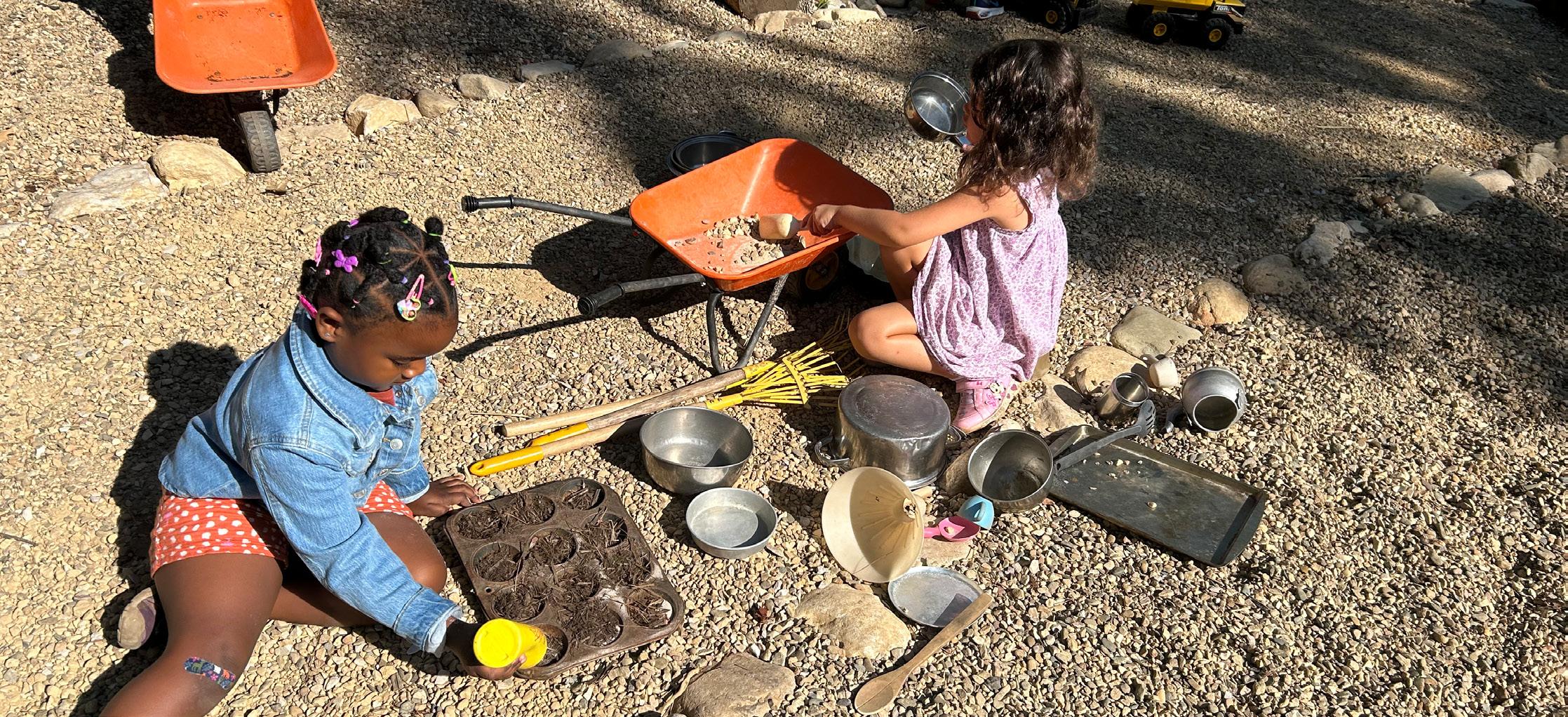
Pre-School students explore basic scientific principles through a variety of hands-on experiences. We encourage students to question and wonder about the natural environment around them. Our science curriculum engages students in the scientific method of inquiry: predicting, experimenting, observing, and changing predictions based on new observations. At their level of inquiry, children are encouraged to connect their ideas to new experiences to add to their knowledge base. The engineering lab and the science lab natural classrooms, along with attributes such as Water Works, raised beds for gardening and the diverse, sensoryrich outdoor environment, provide constant opportunities for meaningful learning. Our Pre-School teachers stimulate curiosity and exploration as students continue the initial steps of becoming lifelong learners.
In this rapidly-changing world, children will need to develop the ability to communicate cross-culturally with people from a wide variety of language and cultural backgrounds. Therefore, through carefully chosen literature, curricular materials, music, and media from around the world, our teachers strive to instill in our PS students curiosity and interest in a variety of cultures and communities. Through teacher-supported activities, our youngest learners begin to negotiate what it means to be a good citizen. Our goal is to learn to live and work together in diverse and inclusive environments. Through social studies, students will develop positive self-identities, listening skills, empathy for their community members, a respect for the natural world, and an appreciation for how we identify ourselves and how we experience belonging in a group.
The visual arts in Pre-School Classes focus on experimental, exploratory, sensory, and creative activities in a wide range of media. A variety of art materials including papers, pencils, pastels, paint, and printmaking tools help foster personal creativity and skill development geared to the wide range of individual interests and abilities at this age. The Art Lab at Saints’ Meadow provides multiple opportunities for art projects led by teachers, Upper School students, and community professionals. The greatest provider of new experiences in the arts, of course, is the sensory-rich outdoor environment, which provides boundless opportunities for creativity and connection with other members of the school community. Music & Movement is a joyful and enriching part of each day, giving Pre-School students the opportunity to experience and appreciate a variety of musical styles, genres, and traditions. The songs chosen accentuate daily activities,
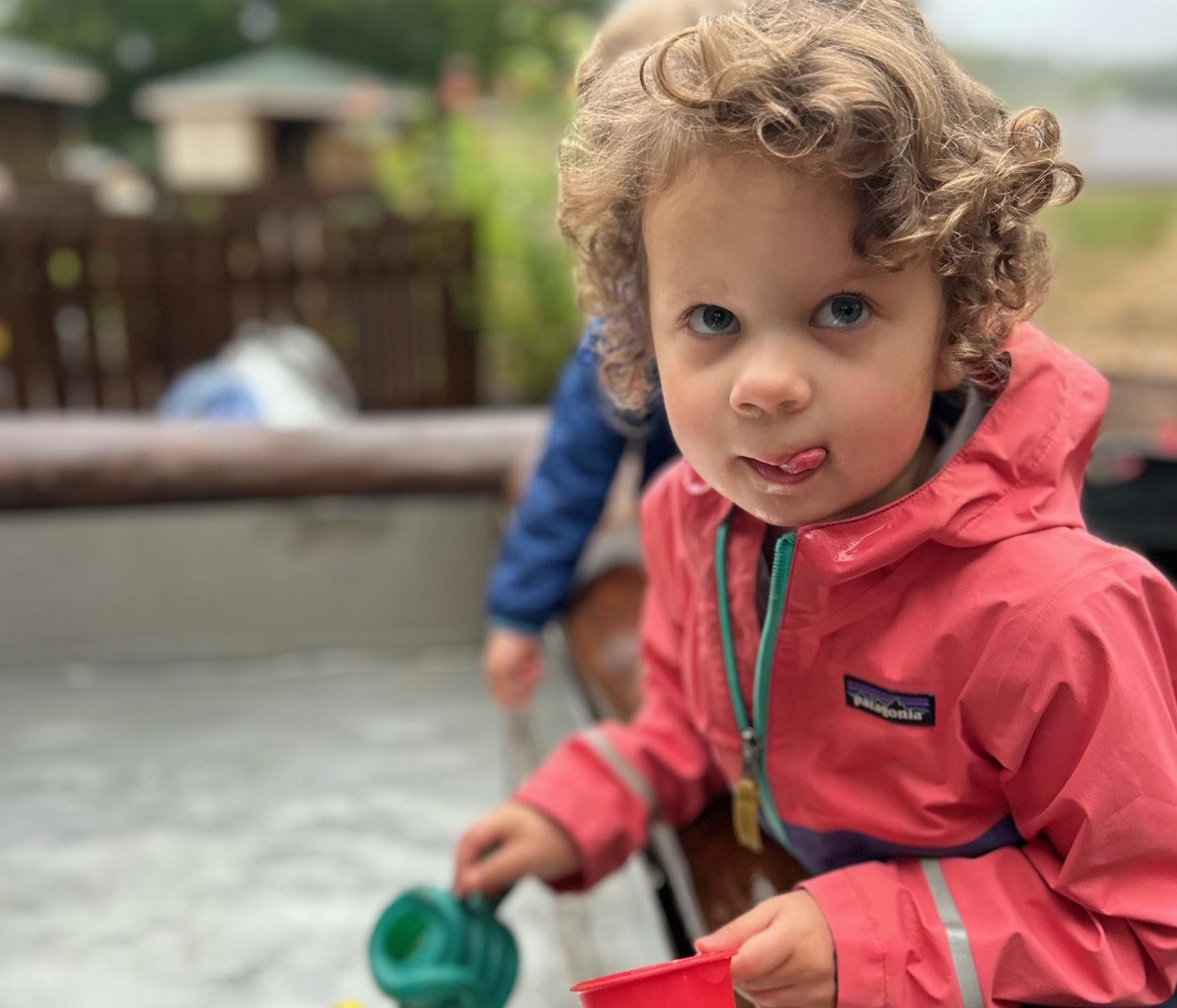
helping to make transitions, relax, imagine, and engage with one another. Rhythm, tempo, beat, and melody of each song are noticed along with patterns and similarities. Children are exposed to the emotion conveyed in music and how songs contribute to moods and feelings. Coordinated dances and games are made possible by listening, anticipating, and focusing on body and spatial awareness. Simple instruments and other manipulatives, such as ribbons or scarves, are utilized to enhance learning.
Dramatic play rounds out the PS fine arts experience. Children enjoy dramatic play both inside and outside as they experiment with creative and imaginative roles inspired by the world around them. For example, they create “families” under the trees and the mud kitchen, and build homes for dinosaurs in the garden sandbox area. Stories, songs, and poems are used extensively to enrich each student’s learning experience.
While our Pre-School students do not participate in formal physical education classes, the development of motor skills is an important part of our curriculum. Our goal is that each child will develop gross motor skills, spatial awareness, agility, balance, coordination, and strength with safe and appropriate risk taking. This goal is supported via areas in the natural classrooms such as climbing logs for hand-eye coordination and balance, as well as sandboxes that strengthen hand muscles and enhance coordination. A beautiful meadow serves as a center for free play, yoga, and mindfulness. Our Quarry and engineering lab space is filled with stones and natural materials that encourage lifting, loading, pulling, and building with shovels and wheelbarrows, trucks, and buckets. Play equipment encourages hand-eye coordination and balance for all levels of abilities. Hiking, whether on trails or to visit other areas on campus, supports the development of resilience and endurance.
The Junior Kindergarten Classes are designed for children with late summer and early fall birthdays who are nearly ready for Kindergarten but would benefit from an extra year of growth. Each day in the JK includes a balance of independent play, teacher-directed group activities, and individual instruction, all within a nature-based outdoor setting and spacious indoor classrooms. This approach allows children to develop at their own pace, fostering independence, collaboration, and a deep connection with the natural world. Our teachers implement a vast array of activities to expose students to specific content areas. These interdisciplinary activities function together to emphasize the major development areas of emotional, social, physical, and cognitive development.
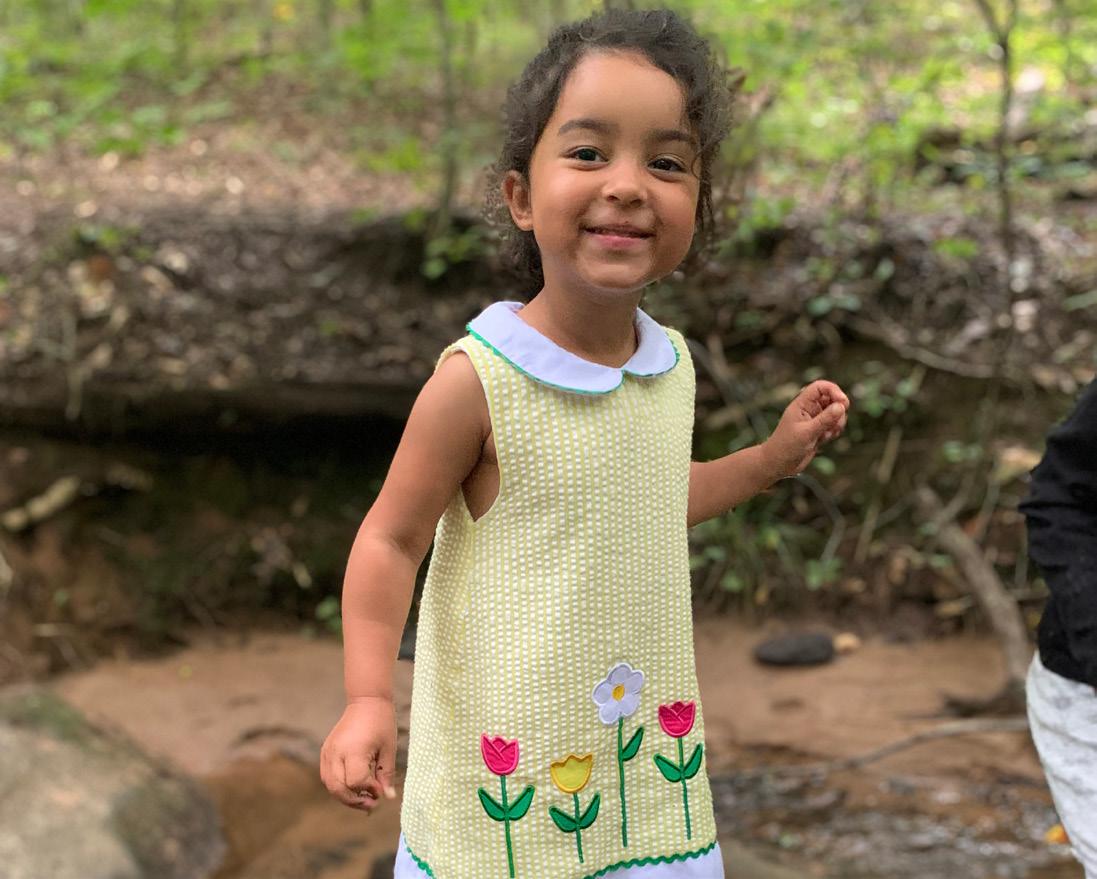

The Junior Kindergarten experience is for children who are ready for emotional, social, physical, and cognitive experiences beyond the expectations that are required in a Pre-School setting. Our JK is designed to provide a dynamic environment which recognizes the importance of an interdisciplinary approach that combines traditional academic areas into a cohesive learning experience through experimentation and play. We know that children need to connect through their senses, exploring through selfdiscovery to make sense of their world. These experiences allow children to build upon teacher-directed activities. Children are able to relate to the materials in their own unique ways. Teachers serve as facilitators, encouraging and supporting each child’s individual needs. Our teachers lay the groundwork for the lifelong development of a curious mind and the love of learning.
At the Junior Kindergarten level, the language arts are taught through an integrated approach. The aim is to reinforce the connection between reading, writing, speaking, and listening. By embedding language arts throughout the day and differentiating instruction, we support the diverse literacy needs of Junior Kindergarten students, fostering a love for reading and writing while developing critical communication skills. Activities occur throughout the day both in small group and whole-group settings.
The JK is designed to accommodate a range of literacy levels. Children who are ready for more challenging experiences have numerous opportunities to work with the teacher one on one and in small instructional groups. Students are immersed in reading and writing activities throughout the school day. A special emphasis on journaling in the JK allows children to express their creativity and understanding of lessons at their individual literacy level through pictures and words.
Oral language experiences are an important part of daily instruction as students tell about their experiences and share each day with the class. Each day, students participate in learning through question and answer relationships. Morning Meeting is an integral part of our day when characteristics of a listener are emphasized: looking at the speaker and thinking about what the speaker is saying. Students practice these steps as they decide how to solve problems and share ideas in small and large groups.
Students are immersed in literature throughout the day. The teacher reads and writes with the children daily and ensures that the lessons include:
• A rich vocabulary
• A rich selection of quality children’s literature reinforcing concepts taught
• Poems, signs, labels, and captions on display
• The class list of children’s names, posted and used for visual recognition games
• Poems and songs, both rhyming and non-rhyming
• Phonemic awareness games which include rhyming games, concept of spoken word, syllable blending, and matching sounds
• Manipulatives, clapping, and rhythm sticks to count words and syllables in a word
• Phonics/phonemic awareness activities
Children participate in activities which emphasize correct pencil grip and body posture especially through their journaling work. Children also have numerous opportunities to use materials and tools that strengthen fine motor skills. For example, the Junior Kindergarten classroom includes special “tinker boxes” full of curated loose parts. A child might create a mosaic or design an imaginative scene on sand, which supports a pincer grip for hand strength, coordination, and precision. In addition to the tinker boxes, the Junior Kindergarten Classes make full use of all the opportunities in the natural classrooms such as sand play and manipulating natural materials. They engage both independently and by collaborating with others for the development of these skills.
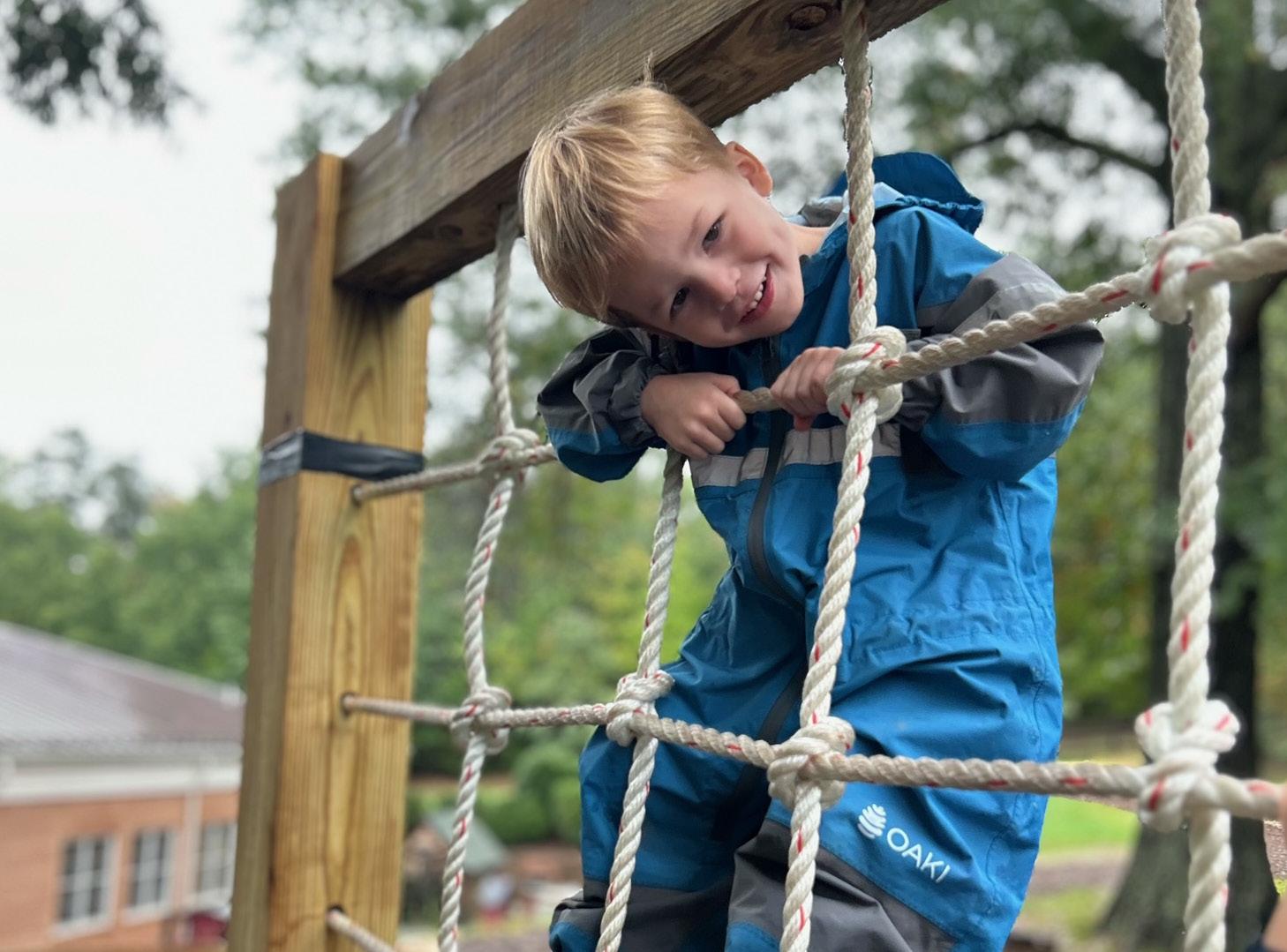
Junior Kindergarten students discover mathematics through exploration. We recognize and build upon each child’s level of mathematical information and understanding by integrating it across subject areas through verbal interaction, hands-on activities, and individual instruction. The activities support a variety of mathematical concepts which include: one-to-one correspondence, rapid identification of sets of objects, comparing and ordering sets of objects, identifying and comparing shapes, sorting by attributes, graphing, recognizing and extending patterns, measuring, and calendar concepts. All of these skills are practiced daily through play and exploration in places such as the engineering lab and the Water Works station in the natural classrooms.
Students in Junior Kindergarten explore basic scientific principles through a variety of hands-on experiences and question and answer relationships. The science curriculum engages students in the scientific method of inquiry: predicting, experimenting, observing, and changing predictions based on new observations.
One of the features in the indoor Junior Kindergarten classroom is the Growing Corner. Students plant seeds and care for the plants in a large grow light center while observing and tracking their growing plant’s progress. At their level of inquiry, children are encouraged to connect their ideas to new experiences to add to their knowledge base. The science curriculum provides many opportunities for students to explore the natural world with opportunities for collection and observation. An emphasis in the Junior Kindergarten Classes is to notice the small details in nature and to learn more about the local ecosystem. Areas of study include the characteristics of local fauna and animal life, fall leaves and rocks, and other areas of interest our students notice in the natural classroom. This encourages students to ask questions, make predictions, and try out theories that are meaningful to their everyday lives. In addition to their work in the ECP program, the Junior Kindergarten classes join the K – 4 science teacher once a week for additional programming.
In our rapidly-changing world, children must eventually develop the ability to communicate cross-culturally with people from a wide variety of language and cultural backgrounds. Through carefully-chosen literature, curricular materials, music, and media from around the world, our teachers strive to instill in our Junior Kindergarten students curiosity and interest in a variety of cultures and communities. Through teacher-supported activities, our students begin to negotiate what it means to be a good citizen. The goal is to learn to live and work together in diverse and inclusive environments. Through social studies, students will develop positive self-identities, listening skills, empathy for their community members, and an appreciation for similarities as well as differences. An additional feature of Junior Kindergarten is their participation with the Big Buddy Program, where once a week they have the joyful mentorship of Upper School students in a variety of activities.
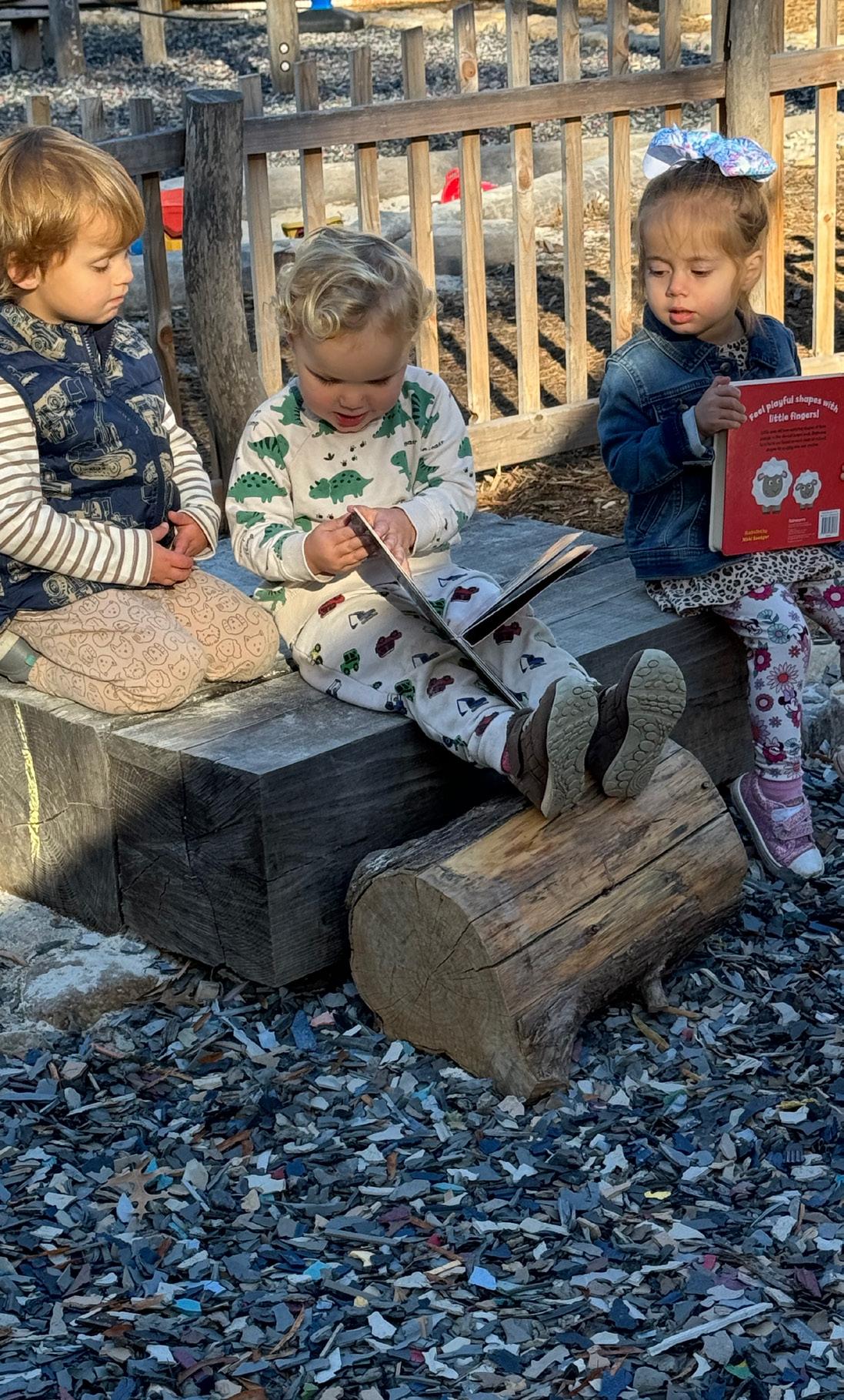
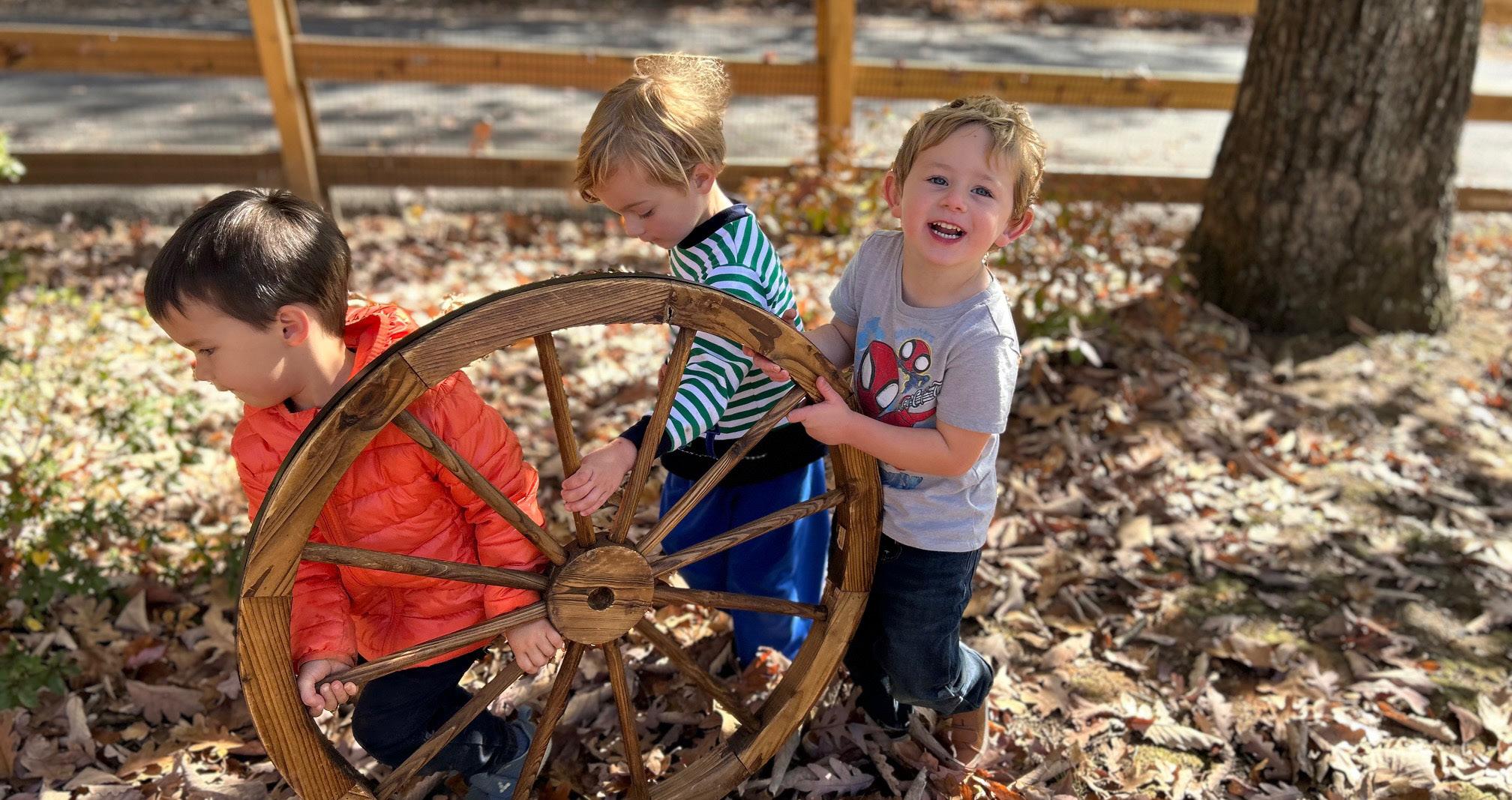
Visual arts in Junior Kindergarten focus on experimental, exploratory, sensory, and creative activities in a wide range of media. A variety of papers, pencils, pastels, paint, printmaking, and construction materials help foster personal creativity and skill development geared to the wide range of individual interests and abilities at this age. In addition to their work in the ECP program, Junior Kindergarten classes join the K – 4 art teachers each week for additional programming. Music & Movement is a joyful and enriching part of each day, giving students the opportunity to experience and appreciate a variety of musical styles, genres, and traditions. The songs chosen accentuate daily activities, helping to make transitions, relax, imagine, and engage with one another. Rhythm, tempo, beat, and melody of each song are noticed along with patterns and similarities. Children are exposed to the emotion conveyed in music and how songs contribute to moods and feelings. Coordinated dances and games are made possible by listening, anticipating, and focusing on body and spatial awareness. Simple instruments and other manipulatives, such as ribbons or scarves, are utilized to enhance learning. In addition to their work in the ECP program, Junior Kindergarten students join the K – 4 Music & Movement teacher each week for additional programming. Dramatic play rounds out the Junior Kindergarten fine arts experience. Children enjoy dramatic play at the many outdoor stations that encourage role playing, imaginary dramatic scenes, as well as puppetry under the trees. Stories, songs, and poems are acted out to enrich each student’s learning experience.
While our Junior Kindergarten students do not participate in formal physical education classes, the development of motor skills is an important part of our curriculum. Teachers offer daily opportunities for gross motor experiences in both teacher-directed and student-initiated situations providing for individual differences and varying levels of maturity. Teachers promote the development of fundamental movement abilities involving locomotion, control, quality of movement, and stability. Areas at Saints’ Meadow include natural climbing logs and yoga opportunities. Our Quarry and engineering lab space is filled with stones and natural materials that encourage loading, lifting, pulling, and building with shovels and wheelbarrows, trucks, and buckets. Play equipment encourages hand-eye coordination and balance for all levels of abilities. Hiking, whether on trails or to visit other areas on campus, supports the development of resilience and endurance. Our goal is that each child will develop gross motor skills, spatial awareness, agility, balance, coordination, and strength.

St. Anne’s-Belfield School 799 Faulconer Drive | Charlottesville, VA 22903 admission@stab.org | www.stab.org | (434) 296-5106
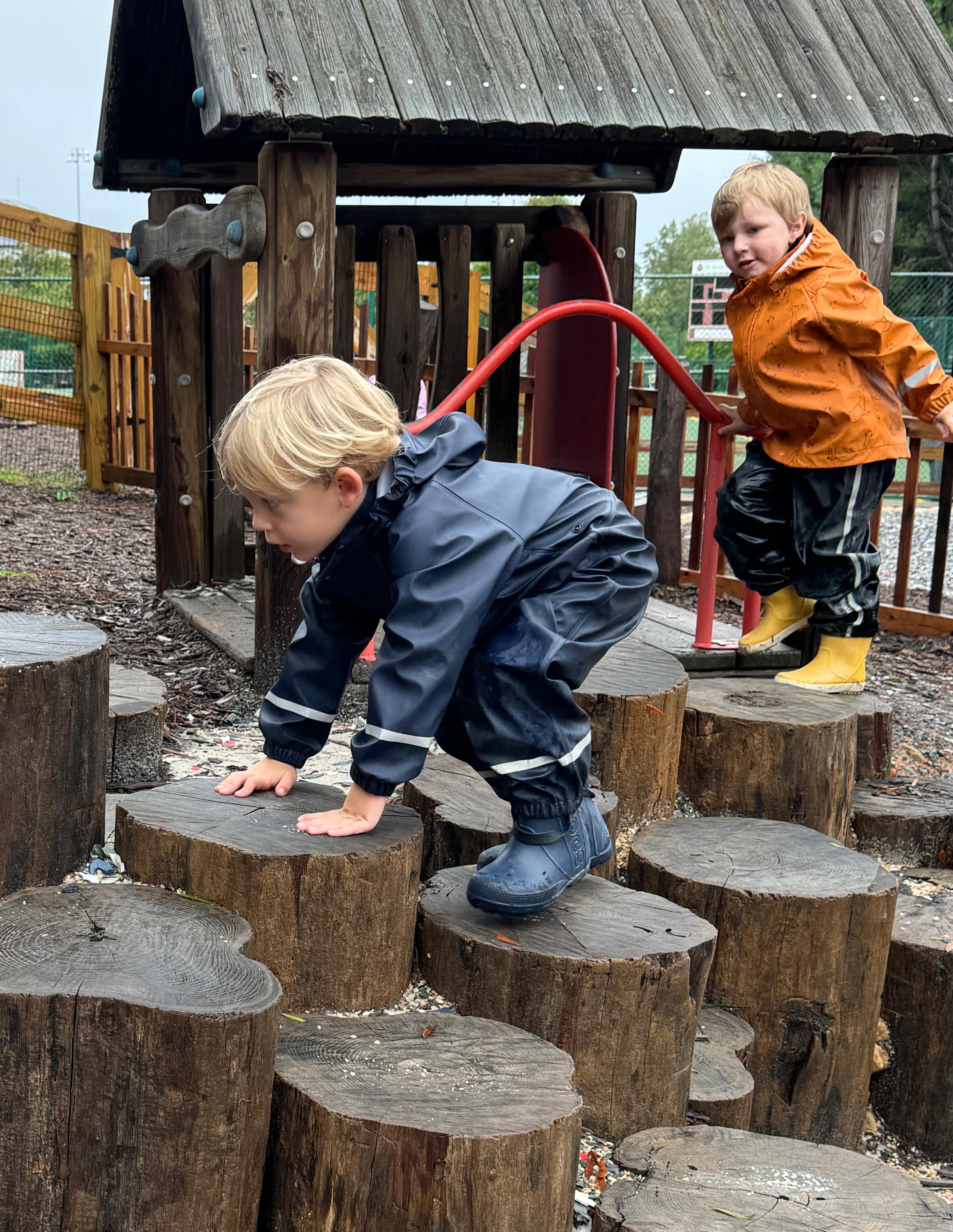
The School admits qualified students of any race, color, national origin, place of birth, ancestry, sex, religion, gender, gender identity, sexual orientation, mental or physical disability, or any status protected by applicable law, and extends to them all the privilege to participate in the educational programs generally accorded or made available to students at the School. The School does not discriminate on the basis of race, color, national or ethnic origin, ancestry, sex, religion, gender identity or expression, sexual orientation, mental or physical disability, or any status protected by applicable law in the administration of its admission or its educational programs.